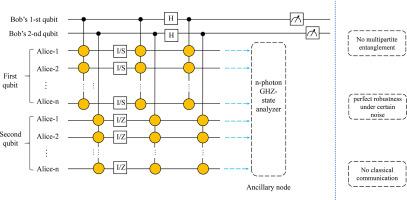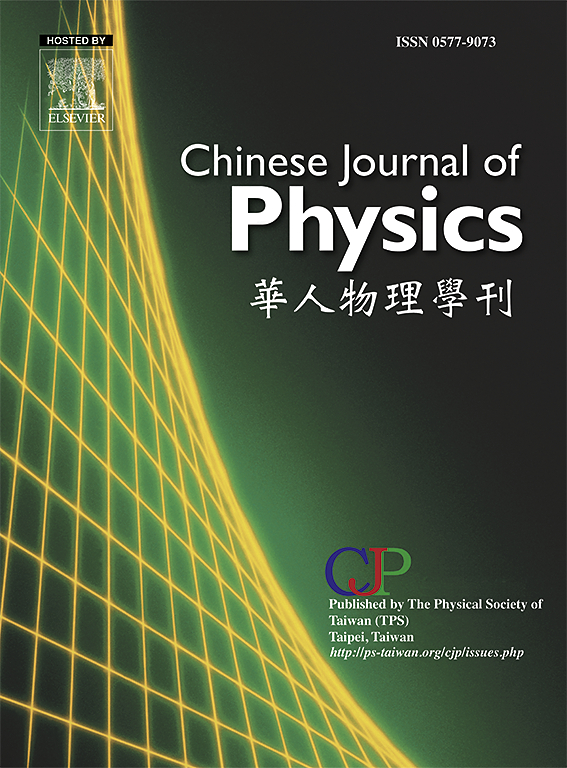无多部量子纠缠的可扩展和完美的抗噪声通信
IF 4.6
2区 物理与天体物理
Q1 PHYSICS, MULTIDISCIPLINARY
引用次数: 0
摘要
最近,Chakraborty等人考虑了一种分布式计算场景,其中多个发送者和单个计算服务器计算其输入字符串的特定全局函数[物理]。[j].农业工程学报,2011(3),326(2025)。他们证明,当发送者和服务器共享多方格林伯格-霍恩-塞林格(GHZ)状态时,与没有纠缠的情况相比,n个发送者的经典通信开销可以减少n - 1位。然而,单一电路对GHZ状态制备的深度要求以及GHZ状态不可靠的远距离分布限制了这些分布式计算任务在当前条件下的实际应用。本文提出了一种不需要多方纠缠态的分布式计算协议。我们分析了我们的协议在某些类型的噪声下的性能。我们证明了我们的协议有一个独特的优势:它在这些类型的噪声下表现出完美的鲁棒性。此外,与需要每个发送方进行1位经典通信的基于ghz状态的协议相比,我们的协议消除了对经典通信的需求。此外,随着发送者数量的增加,这种优势可以任意扩展。我们的建议为实际的通信复杂性任务提供了一条重要的途径。本文章由计算机程序翻译,如有差异,请以英文原文为准。

Scalable and perfect noise-robust communication with no multipartite quantum entanglement
Recently, Chakraborty et al. considered a distributed computing scenario in which multiple senders and a single computing server compute a specific global function of their input strings [Phys. Rev. A 111(3), 032617 (2025)]. They demonstrated that when the senders and the server share a multipartite Greenberger–Horne–Zeilinger (GHZ) state, the classical communication overhead can be reduced by bits for senders in contrast to the scenario without entanglement. However, the depth requirements of unitary circuits for GHZ state preparation, as well as the unreliable long-distance distribution of GHZ states, limit the practical applications of these distributed computing tasks under current conditions. Here, we propose a feasible distributed computing protocol that does not require multipartite entangled states. We analyze the performance of our protocol under certain types of noise. We demonstrate that our protocol has a unique advantage: it exhibits perfect robustness under these types of noise. In addition, in contrast to the GHZ-state-based protocol, which requires one bit of classical communication from each sender, our protocol eliminates the need for classical communication. Moreover, this advantage can scale arbitrarily as the number of senders increases. Our proposal provides an important pathway for practical communication complexity tasks.
求助全文
通过发布文献求助,成功后即可免费获取论文全文。
去求助
来源期刊

Chinese Journal of Physics
物理-物理:综合
CiteScore
8.50
自引率
10.00%
发文量
361
审稿时长
44 days
期刊介绍:
The Chinese Journal of Physics publishes important advances in various branches in physics, including statistical and biophysical physics, condensed matter physics, atomic/molecular physics, optics, particle physics and nuclear physics.
The editors welcome manuscripts on:
-General Physics: Statistical and Quantum Mechanics, etc.-
Gravitation and Astrophysics-
Elementary Particles and Fields-
Nuclear Physics-
Atomic, Molecular, and Optical Physics-
Quantum Information and Quantum Computation-
Fluid Dynamics, Nonlinear Dynamics, Chaos, and Complex Networks-
Plasma and Beam Physics-
Condensed Matter: Structure, etc.-
Condensed Matter: Electronic Properties, etc.-
Polymer, Soft Matter, Biological, and Interdisciplinary Physics.
CJP publishes regular research papers, feature articles and review papers.
 求助内容:
求助内容: 应助结果提醒方式:
应助结果提醒方式:


